
Catalog excerpts

Implants trauma Revolution X Pelvic Reconstruction System
Open the catalog to page 1
CAUTION: Federal Law (USA) restricts this device to sale by or on the order of a board certified physician. WARNING: If there is no sufficient bone healing, wrong or incomplete postoperative care, plate might break. All ITS plates are preformed anatomically as a matter of principle. If adjustment of the plate to the shape of the bone is required, this is possible by carefully bending gently in one direction once. Particular care is required when bending in the region of a plate hole, as deformation of the plate may lead to a failure of the locking mechanism. The plate must not be buckled or...
Open the catalog to page 2
1. Introduction P. 5 Preface P. 6 Screws P. 7 Properties P. 8 Indications P. 9 Contraindications & Time of operation 2. Surgical Technique P. 10 Instruments P. 10 Pelvic Extension System P. 11 Pelvic Basis Set P. 12 Fractures of the acetabulum P. 13 Fractures of the pelvic ring P. 14 Fractures of the quadrilateral surface P. 15 Assembling of the clamp for the quadrilateral plate P. 15 Application of the quadrilateral plate P. 16 Fractures of the symphysis P. 17 Fractures of the ilium P. 18 Fractures of the SIJ P. 19 Ilio-iliac distance osteosynthesis P. 20 Postoperative treatment P. 20...
Open the catalog to page 3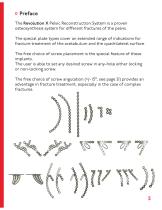
Preface The Revolution X Pelvic Reconstruction System is a proven osteosynthesis system for different fractures of the pelvis. The special plate types cover an extended range of indications for fracture treatment of the acetabulum and the quadrilateral surface. The free choice of screw placement is the special feature of these implants. The user is able to set any desired screw in any-hole either locking or non-locking screw. The free choice of screw angulation (+/- 15°, see page 21) provides an advantage in fracture treatment, especially in the case of complex fractures.
Open the catalog to page 5
Spiral Drill, D=2.7mm, L=220mm, AO Connector Cancellous Screw, Locking, D=4.2mm Spiral Drill, D=2.5mm, L=220mm, AO Connector Cortical Screw, Locking, D=3.5mm Spiral Drill, D=2.7mm, L=220mm, AO Connector
Open the catalog to page 6
Properties Properties of the material: • Plate material: Titanium • Material of screws: TiAl6V4 ELI • Easier removal of the implant after the fracture has healed • Improved fatigue strength of the implant • Reduced risk of cold welding • Reduced risk of inflammation and allergy • Multi-directional Locking • Can be anatomically shaped with bending irons • Plate strength: 2.5mm (Symphysis Plate 4.0mm) • Special plate types for fracture treatment of the acetabulum and the quadrilateral surface
Open the catalog to page 7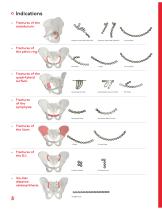
Indications • Fractures of the acetabulum: Posterior Pelvic Wall Plate Ext. Posterior Pelvic Wall Plate & II Curved Plate Curved Plate Quadrilateral Plate Quadrilateral Column Plate Symphysis Plate Symphysis Plate Curved Curved Plate • Fractures of the pelvic ring: • Fractures of the quadrilateral surface: • Ilio-Iliac distanceosteosynthesis:
Open the catalog to page 8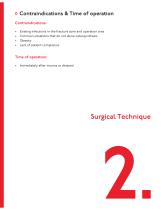
Contraindications & Time of operation Contraindications: • • • • Existing infections in the fracture zone and operation area Common situations that do not allow osteosynthesis Obesity Lack of patient compliance Time of operation: • Immediately after trauma or delayed Surgical Techni
Open the catalog to page 9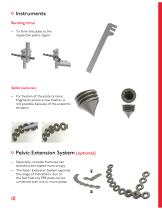
Instruments Bending Irons: • To form the plate to the respective pelvic region Spike (optional): • For fixation of the plate to bone fragments where screw fixation is not possible because of the anatomic situation Pelvic Extension System (optional) • Especially complex fractures can therefore be treated more simply • The Pelvic Extension System expands the range of indications, due to the fact that any PRS plate can be combined with one or more plate
Open the catalog to page 10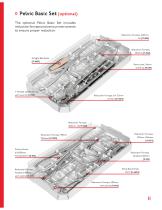
Pelvic Basic Set (optional) The optional Pelvic Basic Set includes reduction forceps and various instruments to ensure proper reduction. Reduction Forceps, 400mm, 2x1 (17-1556) Reduction Forceps, 250mm (17-1552) Straight Ball Spike (17-1600) Bone Lever, 24mm width tip (9-676) T-Handle Jacobs Chuck, with wrench (9-090) Reduction Forceps, for 3.5mm Screws (17-1404) Reduction Forceps, 400mm, 1x1 (17-1558) Reduction Forceps, Reduction Forceps, Sharp Bone Hook, Reduction Forceps, Farabeuf, 190mm, with ratchet (9-521) Reduction Forceps, 200mm, with points (9-604)
Open the catalog to page 11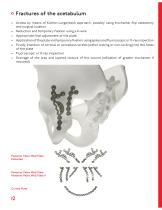
Fractures of the acetabulum • Access by means of Kocher-Langenbeck approach, possibly using trochanter-flip osteotomy and surgical luxation • Reduction and temporary fixation using a K-wire • Appropriate final adjustment of the plate • Application of the plate and temporary fixation using spikes and fluoroscopic or X-ray inspection • Finally, insertion of cortical or cancellous screws (either locking or non-locking) into the holes of the plate • Fluoroscopic or X-ray inspection • Drainage of the area and layered closure of the wound (refixation of greater trochanter if required) Posterior...
Open the catalog to page 12
Fractures of the pelvic ring • Ilio-inguinal approach or possibly modified Stoppa approach • Reduction using Weber or Jungbluth forceps, Schanz screw and temporary K-wire fixation if required • Fluoroscopic or X-ray inspection • Adjustment and setting of reconstruction plate using bending irons • Attachement of the plate and temporary fixation using spikes and fluoroscopic or X-ray inspection • Finally, insertion of cortical or cancellous screws (either locking or non-locking) • Conclude with fluoroscopic or X-ray inspection • Drainage, closure of wound
Open the catalog to page 13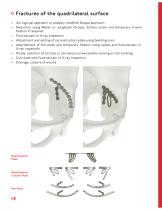
Fractures of the quadrilateral surface • Ilio-inguinal approach or possibly modified Stoppa approach • Reduction using Weber or Jungbluth forceps, Schanz screw and temporary K-wire fixation if required • Fluoroscopic or X-ray inspection • Adjustment and setting of reconstruction plate using bending irons • Attachement of the plate and temporary fixation using spikes and fluoroscopic or X-ray inspection • Finally, insertion of cortical or cancellous screws (either locking or non-locking) • Conclude with fluoroscopic or X-ray inspection • Drainage, closure of wound Quadrilateral Plate...
Open the catalog to page 14All I.T.S. catalogs and technical brochures
-
ufs
1 Pages
-
DHL
2 Pages
-
ITS
2 Pages
-
PHL
24 Pages
-
ACLS
20 Pages
-
CFN
32 Pages
-
OLS
24 Pages
-
PHLs
20 Pages
-
CTN - Cannulated Tibia Nail
28 Pages
-
SR Sacral Rods
20 Pages
-
HCS
24 Pages
-
TOS Twist-Off Screw
20 Pages
-
TLS
20 Pages
-
HLS
20 Pages
-
ES
20 Pages
-
SR
20 Pages
-
FL
24 Pages
-
PL - Pilon Locking Plate small
12 Pages
-
OL - Olecranon Locking Plate
24 Pages
-
CAS
40 Pages
-
FCN
20 Pages
-
HOL
24 Pages
-
FLS
24 Pages
-
PFL
20 Pages
-
DTL
24 Pages
-
HTO
24 Pages
-
PTL
32 Pages
-
DFL
32 Pages
-
SCL
32 Pages
-
SLS
24 Pages
-
CAL
20 Pages
-
DUL
24 Pages
-
CLS
28 Pages



























































